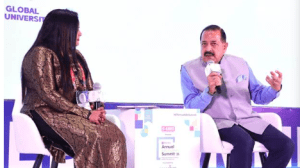New Delhi, June 19, 2025 — In a compelling address at the Economic Times Education Summit 2025, Union Minister Dr. Jitendra Singh, Minister of State (Independent Charge) for Science and Technology and Earth Sciences, underscored India’s extraordinary technological and scientific evolution over the last 11 years under Prime Minister Narendra Modi’s visionary leadership. He hailed this transformation as a national renaissance that has penetrated every Indian household, redefining governance, research, and innovation.
A Decade of Scientific Empowerment
Speaking at the event, Dr. Singh emphasized that India’s advancement in technology and science over the past decade has been nothing short of revolutionary. “There was never a lack of talent in India. What we lacked was an enabling environment,” he said, crediting PM Modi’s leadership for establishing a robust ecosystem where innovation thrives.
He pointed to Operation Sindoor, a recent strategic operation, as an example of India’s enhanced defence capability—highlighting how scientific capacity-building and technological prowess have allowed the country to effectively counter drone and missile threats.
Unlocking Strategic Sectors: The Modi Reforms
Dr. Singh credited the opening up of India’s space and nuclear sectors as landmark reforms that triggered a ripple effect across critical domains such as agriculture, disaster management, e-governance, education, defence, and land record digitization.
“Unlocking these sectors has had a multiplier impact across the board, bringing transformative change,” he said, noting how policy shifts have allowed for the entry of private players, start-ups, and youth-driven innovation in areas once reserved for the state.
The Rise of an Aspirational India
“The rise of aspirations enabled by science and innovation reflects the Ease of Living and Ease of Doing Research,” Dr. Singh asserted. He added that India’s scientific achievements now command global respect, and that Indians abroad today take pride in their identity and homeland’s advancements.
The minister highlighted that India’s growth to the world’s fourth-largest economy, and its future ascent, will be driven by space, biotechnology, and marine sciences.
Biotech Revolution: The BIO-e3 Policy
 At the heart of this transformation lies the new BIO-e3 Policy, which focuses on Economy, Employment, and Environment. Dr. Singh called this policy a catalyst for the biotech revolution, positioning India as a global hub in healthcare, pharmaceuticals, and green innovations.
At the heart of this transformation lies the new BIO-e3 Policy, which focuses on Economy, Employment, and Environment. Dr. Singh called this policy a catalyst for the biotech revolution, positioning India as a global hub in healthcare, pharmaceuticals, and green innovations.
He also underlined India’s leadership in preventive healthcare, referencing the world’s first DNA-based COVID-19 vaccine and the execution of the largest vaccination drive ever conducted.
India’s Expanding Space Ambitions
Dr. Singh celebrated India’s rapid rise in the space domain, stating, “Even though we were late starters, we became the first nation to reach the South Pole of the Moon with Chandrayaan-3.”
He previewed India’s upcoming participation in the Axiom-4 mission, where Group Captain Shubhanshu Shukla will become Mission Pilot and represent India aboard the International Space Station (ISS).
Notably, this mission will include indigenous biotechnology experiments developed by ISRO and the Department of Biotechnology, focusing on space nutrition and life support in microgravity using India-developed biotech kits—foundational research for long-duration human spaceflight.
He revealed that India’s space economy is projected to leap from $8 billion to $44 billion, with over 300+ space start-ups now operating—up from single digits in 2014. India is also making strides in space medicine, he added.
Technology for Governance and the Common Citizen
Dr. Singh highlighted how citizen-centric governance has benefited from technology adoption, citing the Face Recognition Technology for Pensioners and CPGRAMS, India’s grievance redressal system.
“In 2014, around 2 lakh grievances were processed annually. Today, that figure stands at 26 lakh,” he stated, emphasizing the speed and transparency now embedded in public service delivery.
He stressed the need to blend Artificial Intelligence with human empathy to avoid depersonalization in governance. “AI must work with human intelligence—not replace it,” he remarked, proposing a hybrid model for the future.
A Strategic, Secure, and Sovereign India
Dr. Jitendra Singh concluded with an inspiring note: “India has matured into a nation where scientific research is no longer just academic. It is strategic, secure, and sovereign.”
His remarks at the summit not only showcased India’s technological milestones but also offered a roadmap of how innovation will power India’s next phase of growth, security, and global leadership.
For more details, check press release on PIB website.
For more real-time updates, visit Channel 6 Network.

